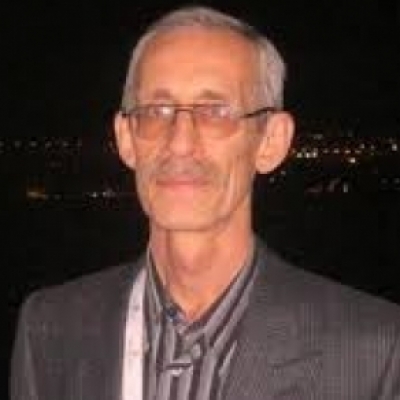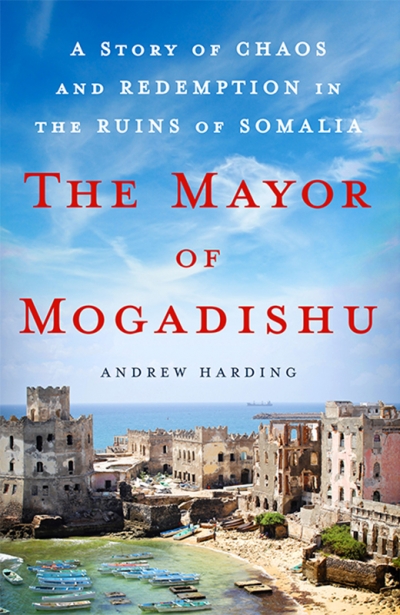



 Eric Walberg
Eric Walberg
The Mayor of Mogadishu: A story of chaos and redemption in the ruins of Somalia by Andrew Harding; St. Martin’s Press, 304 pages, $17.14 hard cover; 2016.
A bright spot in Somalia’s recent history is the subject of Harding’s biography of Mohamud (Tarzan) Nur, son of a shepherd, born in 1956 in what is now Ethiopia. He and brother Yusuf were sent to Mogadishu by his widowed mother, and he grew up in the famous orphanage there that produced many of Somalia’s future political leaders. He gained his nickname as a fighter and basketball star.
When then Somali president, Siad Barre invaded Ogaden on July 13, 1977 (predominantly Somali population under Ethiopian occupation), Nur saw the light, and escaped certain personal disaster via Djibouti. His journey over the next 16 years is a testimony to resourcefulness, forged passports, visa violations, and lots of hard work, earning enough money in Saudi Arabia to help him bring his wife and six sons to London in 1993.
Somalia was now ruled by warlords and awash with lethal Western arms. The famous “Black Hawk down” incident when the US attempted a mini-invasion in Mogadishu took place in 1992. The same warlord scenario was playing out in Afghanistan in the 1990s as well. The same reaction — rural, devout Islamists filling the power vacuum — arose. The people of both countries embraced a strict Muslim “student” movement: in Afghanistan, the Taliban, in Somalia al-Shabab, who disarmed the clans and instituted a strict but fair Shari‘ah legal and economic system, governed by the Qur’an. Both were sympathetic to al-Qaeda, who had abandoned its flirtation with the US in the 1980s, and was now America’s implacable enemy.
The US was against both, given their animosity to the US and support for al-Qaeda, newly labeled “terrorist,” and undermined the legitimate power base in both countries. Afghanistan suffered full-scale invasion in 2001. The West pushed to establish a (Western-backed) Transitional National Government (TNG) in Somalia in 2000, but without “troops on the ground,” had no credibility. After six years without any national government, a genuine alternative coalesced in 2006 — the Islamic Courts Union (ICU), a coalition of Islamists, but still including al-Shabab.
Nur returned to Somalia, hopeful that Somalia had succeeded to walk the tightrope of US ire and clan warfare, where Afghanistan had failed. “These are the right people to make peace in Somalia. No more clan rubbish.” Like Hamid Karzai in Afghanistan in the 1990s, he threw in his lot with “the students” despite their radical Salafism, and hoped to be a bridge with the West, where he had established himself and his family.
But the US nixed any support for the ICU because of al-Shabab. Instead, they convinced Somalia’s enemy Ethiopia to invade in 2007, and when that failed, to have African Union peacekeepers occupy, and help the newly formed Somali army crush the ICU. Nur went back to London, actively organizing protests against the US support for the Ethiopian invasion, but otherwise, biding his time. He would have been happy to work with the ICU (as Karzai was with the Taliban), but was not a Muslim fanatic, and when the new Western-backed coalition government was set up in 2009, Nur was invited to return as mayor of Mogadishu from 2010 to 2014.
The first year and a half were harrowing, with warlords controlling half of Mogadishu, and constant phone threats to kill him, but Nur was unfazed. His family was safely in London. His younger brother Yusuf told Harding, “Fatalism is misunderstood in the West. In Islam, you do all you can to stay alive. You do your best. But after that, you don’t worry.”
Harding’s admiring biography of Nur is full of near-miss assassination attempts and attacks. Particularly tragic was the attack on a modest street festival in 2011 celebrating peace and reconstruction, where four civilians (including the brass band leader) were gunned down, shortly after Nur had left the festivities, where he surely would have been killed if he had stayed a few more minutes.
Finally, possibly because of the worsening famine, or just ashamed at their pointless, unpopular attacks on innocent civilians, the warlords packed up and left Mogadishu two months after the festival debacle, and Nur was able to rebuild the power grid, pave roads, build schools, and create a modest night life for Somalia’s capital. Nur was not as corrupt as Karzai (jokingly referred to as the “mayor of Kabul”), was not handicapped by US invaders, and his success as mayor is heart-warming. The phoenix started to arise from the ashes.
In 2014, the Somali government-led Operation Indian Ocean was launched against insurgent-held pockets in the countryside. The insurgency at home and in the Ogaden, continue in 2017 but compared to Afghanistan, Somalia has hope.
Nur had/has every intention of becoming president some day, but that is unlikely. While well-liked and capable, he has no chance given the complex clan system, his bootstrap education and British passport. Somalis like the remittances from relatives abroad, but they also resent the fact that these emigres lived a relatively easy life when most Somalis were suffering at home. Nur understands this, and is probably just grateful that he and his family are alive, well, and well-educated.
The story of the mayor of Mogadishu is Nur’s cheerful resourcefulness and love of family, unscathed by the decade of collapsing Somalia, and the subsequent two decades of the nightmare as a failed-state. The Mayor of Mogadishu gives a much needed corrective to the image of Muslims and Africa in disarray, of Somalia caricatured as a land of terrorists and starving children, fed to us in the mass media.
